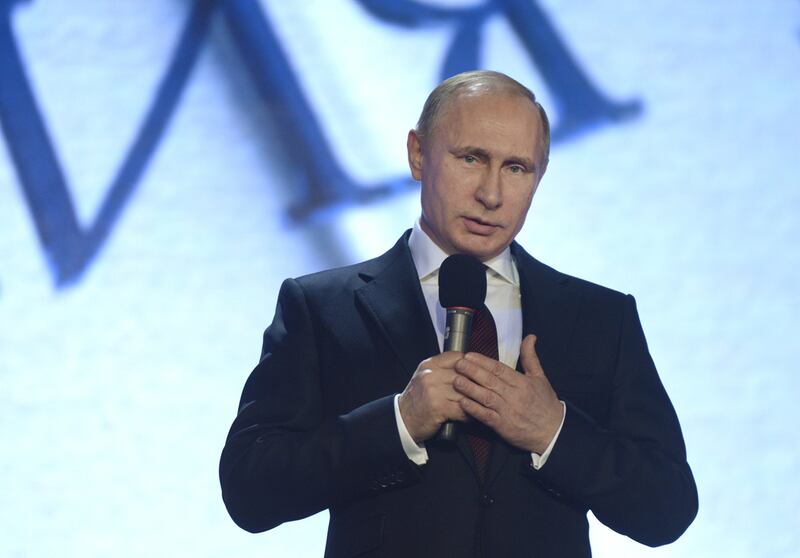NEW DELHI // Russia’s president arrived in India late on Wednesday seeking to revive an old but faltering relationship between the two countries.
Vladimir Putin timed his one-day trip – his sixth to India – to coincide with the 13th annual India-Russia summit. In between signing a host of agreements on military and energy cooperation, he is scheduled to meet Prime Minister Narendra Modi on Thursday.
Facing down anger in the West over Russia’s alleged military intervention in Ukraine, Mr Putin called India “a reliable and time-tested partner”.
“Relations between Russia and India have never been susceptible to momentary developments,” he told the Press Trust of India.
But ties have been tested of late. India is unhappy with Russian arms sales to Pakistan, but has bypassed Russia, its traditional supplier of combat aircraft, to buy French Rafale jets and American Apache helicopters.
Mr Putin told PTI Russia was only working with Pakistan with a view to “improving effectiveness of counter-terrorism and anti-drug operations”, which “serves the long-term interests of all countries of the region”.
Global geopolitics have also affected the relationship.
“If Moscow continues to fight with the West and draw closer to China and Pakistan, there is a real danger that India’s long-standing romance with Russia might turn sour,” C Raja Mohan, a fellow at the Observer Research Foundation think tank, wrote in the Indian Express newspaper on Wednesday. “The structure of the partnership, too, is looking less special amid extended stagnation.”
Mr Putin’s visit comes “at a time when there is greater convergence of interests between India and the United States, than between India and Russia”, said Nitin Pai, director of the Takshashila Institution think tank in Bengaluru.
“That said, Russia bears greater responsibility for the divergence in relations with India, for it has almost gratuitously pursued an arms-sale relationship with Pakistan,” Mr Pai said.
“Those sales have little utility other than sending unwelcome signals to New Delhi.”
Mr Putin has said restoring military cooperation was at the top of his agenda in India.
Russia sold arms worth nearly US$40 billion (Dh147bn) to India over the past half-century. But India’s appetite for arms remains.
Last year alone, New Delhi spent about $6bn on defence purchases, and analysts have estimated it will spend another $250bn over the next decade.
Mr Putin is expected to push Russia’s Sukhoi Superjet-100 and MS-21 passenger planes, and to explore a partnership in helicopter manufacturing. He also mentioned the potential for “joint development and production of advanced weapons systems”.
His agenda also includes energy. Russia aims to build as many as 25 new nuclear energy units in India, along the lines of the reactors in Kudankulam, a new nuclear plant built by India and Russia in Tamil Nadu state.
Moscow is also looking to India as a customer for its natural gas, particularly after European Union sanctions that have cut down Europe’s imports.
Last year, state-owned Gazprom sold 0.11 million tonnes of liquefied natural gas to India. A 2012 agreement that took effect this year stipulates that India will buy 2.5 million tonnes annually for the next 20 years.
Despite recent tensions, Mr Putin will be welcomed warmly in New Delhi, Mr Pai said. “Russia has been and can be a useful partner for India.”
“Mr Putin should look at how Russian industry can take advantage of Mr Modi’s ‘Make in India’ initiative, especially in defence and technology,” Mr Pai added.
Mr Putin and Mr Modi have met briefly twice – at the Brics summit in Brazil in July and at the G20 meet in Australia last month. They are alike in that both are strong men intent on propelling their nations back into global contention.
While in Brazil, Mr Modi showered praise on India’s relationship with Russia.
“If you ask anyone among the more than one billion people living in India who is our country’s greatest friend, every person, every child knows that it is Russia,” Mr Modi said.
ssubramanian@thenational.ae





